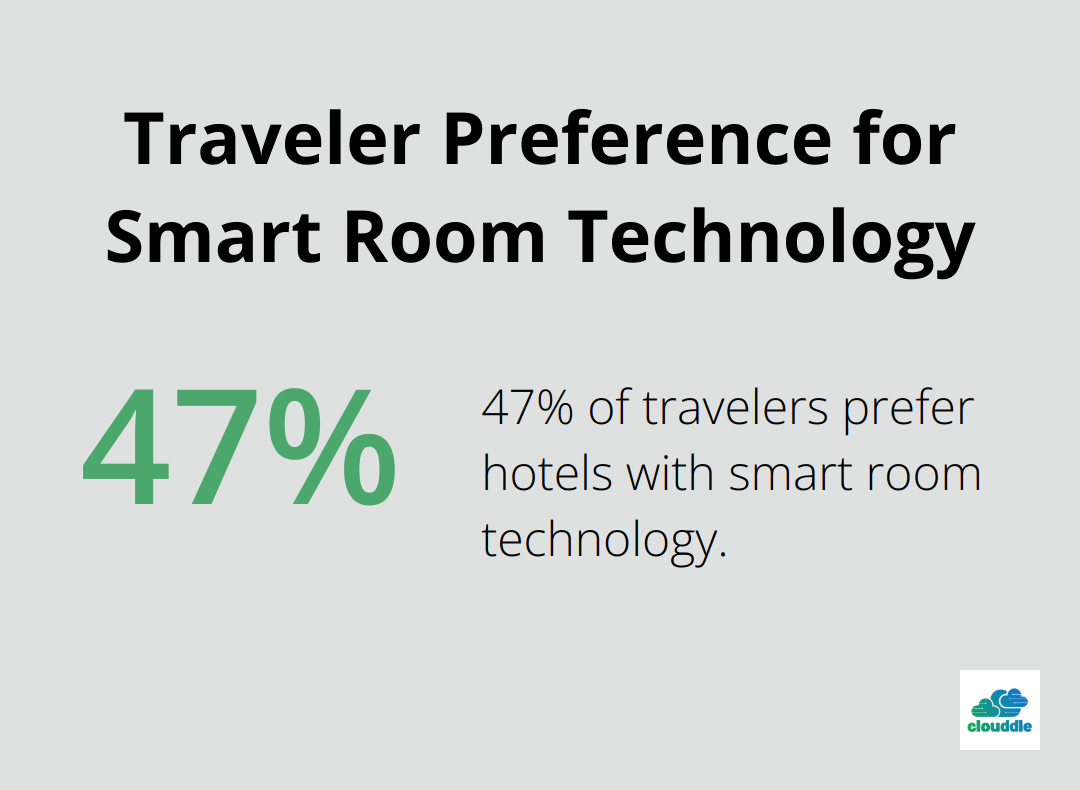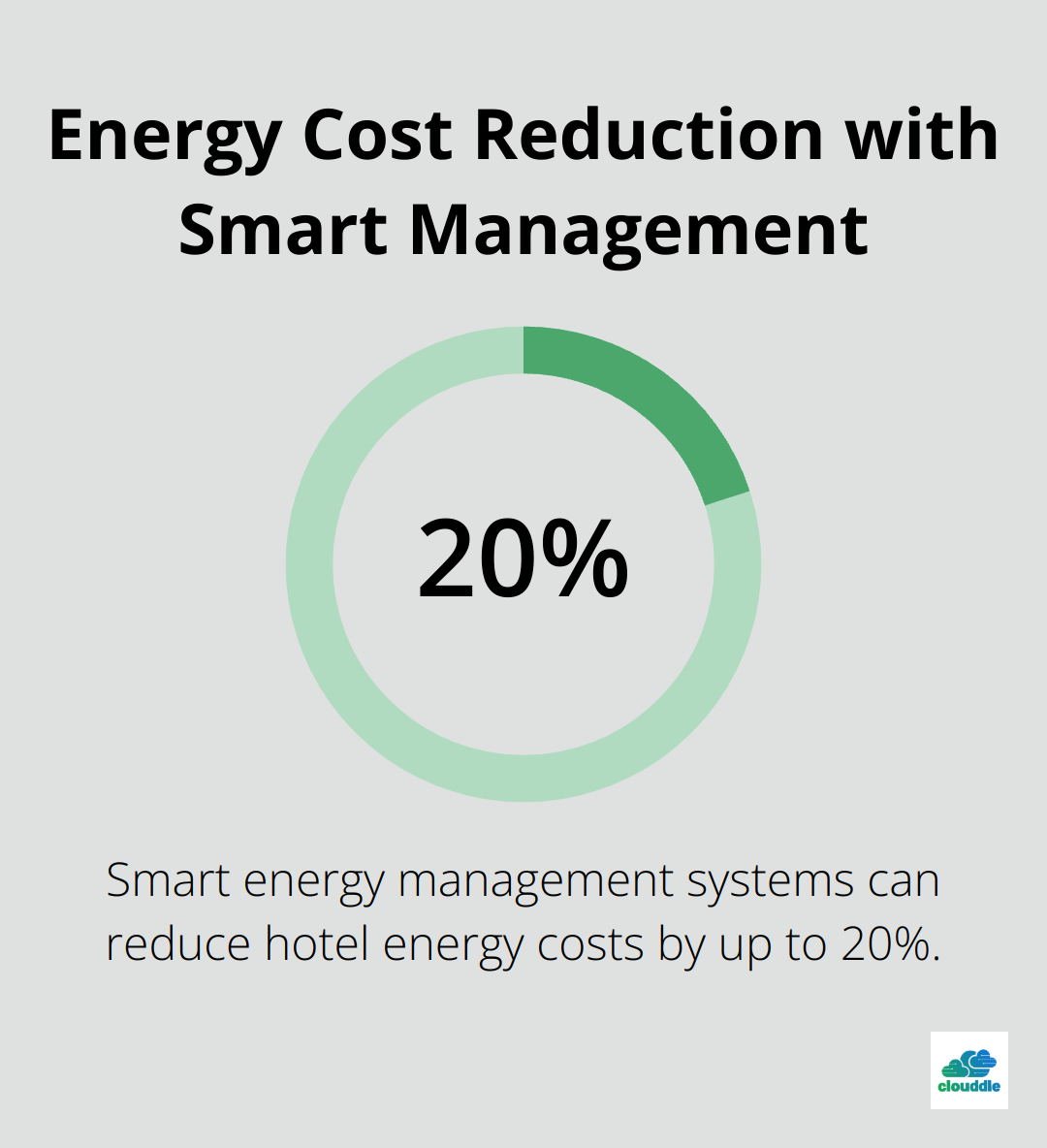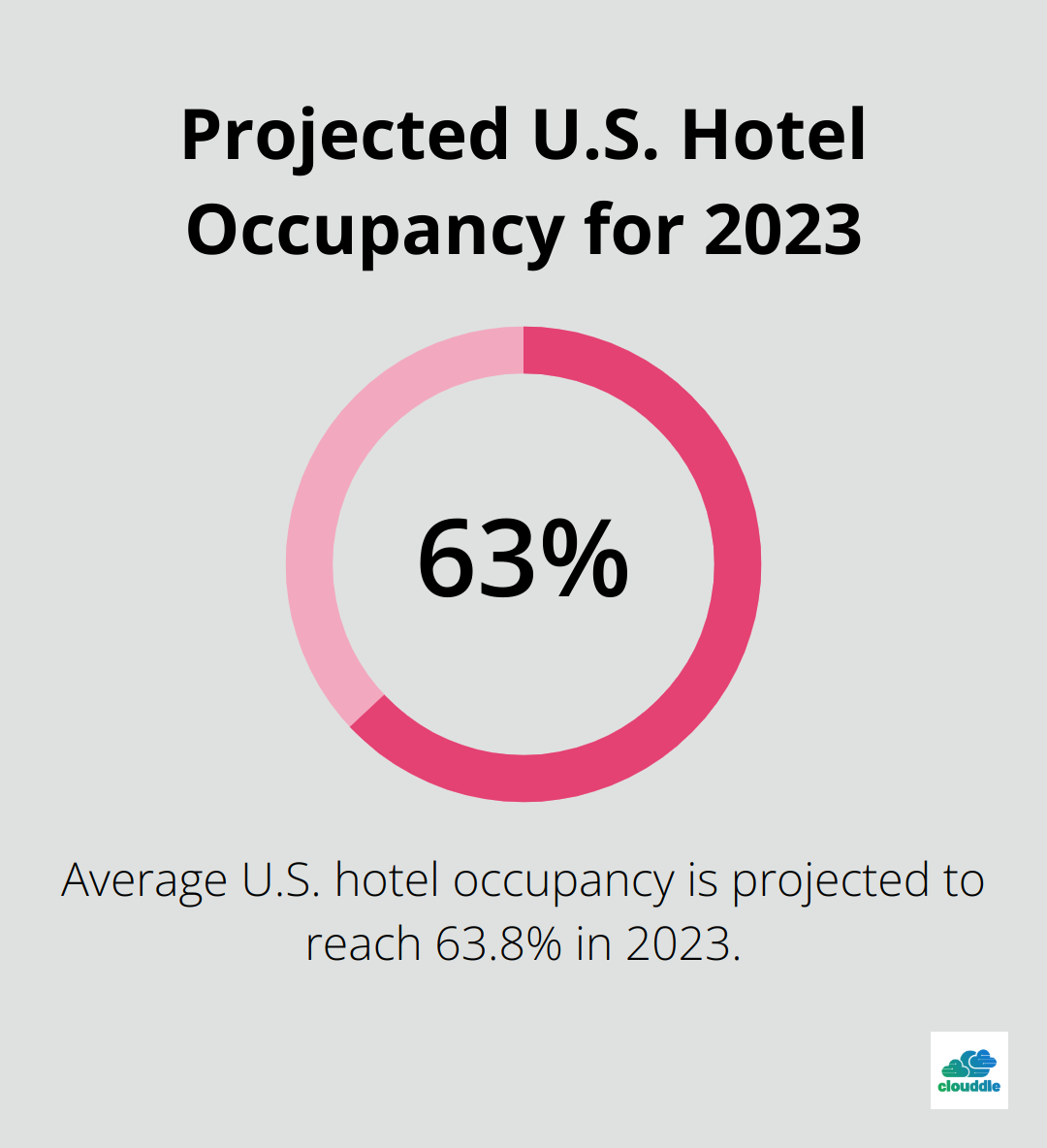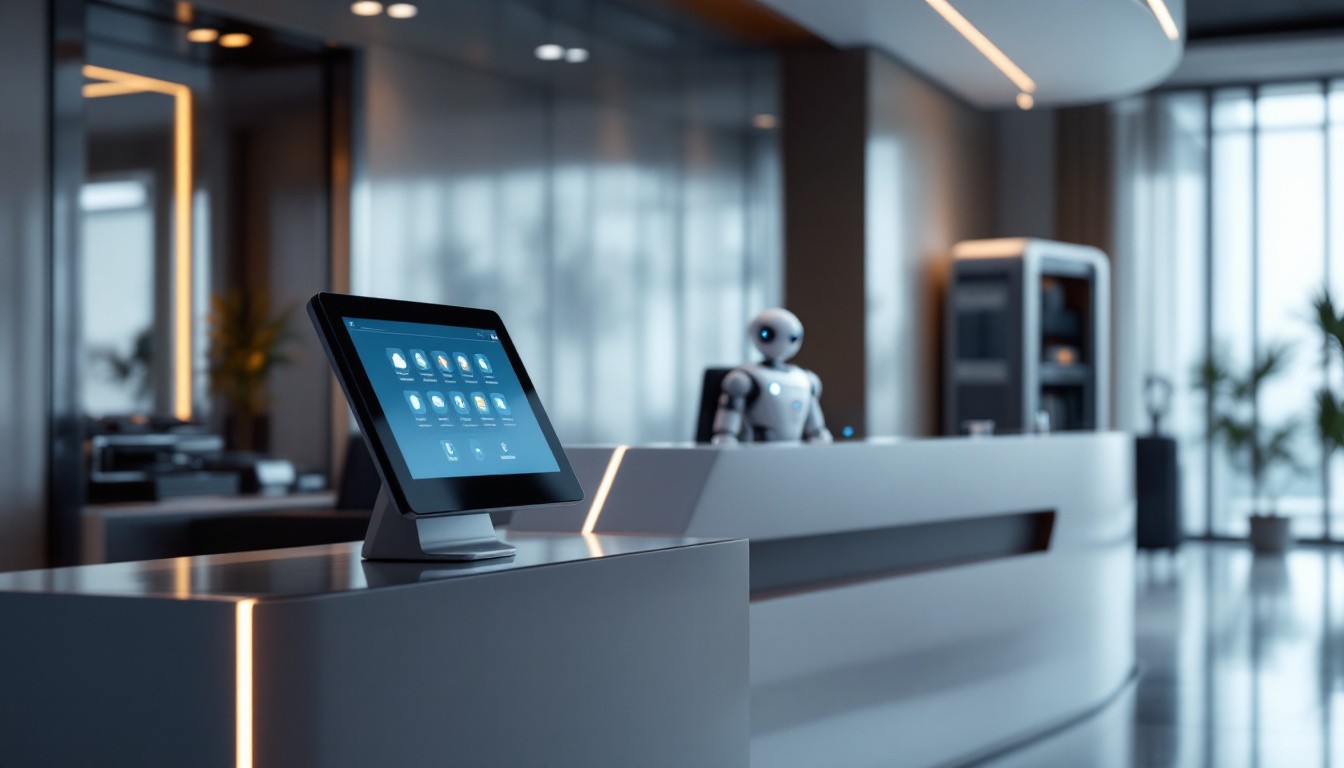The hospitality industry is undergoing a technological revolution. From AI-powered personalization to contactless solutions, these innovations are reshaping guest experiences and operational efficiency.
At Clouddle, we’ve observed how hospitality industry technology trends are transforming hotels, resorts, and restaurants worldwide. In this post, we’ll explore the latest advancements that are setting new standards in the sector.
How AI Revolutionizes Hospitality
AI and machine learning transform the hospitality sector, reshaping guest experiences and operational efficiency. These technologies are practical tools that set new standards in the industry.
AI Tailors Guest Experiences
AI-driven personalization changes the game in hospitality. Hotels use AI to analyze guest data from multiple sources, creating hyper-personalized experiences. By predicting booking patterns, hotels can adjust pricing and offer personalized promotions to maximize occupancy and revenue.
Hotels can use AI to remember guest preferences (room temperature, pillow type, etc.), ensuring a tailored stay without repeated requests.
Predictive Analytics Optimizes Pricing
Revenue management becomes more sophisticated with predictive analytics. AI algorithms now forecast demand, optimize pricing, and maximize occupancy rates with unprecedented accuracy.
PriceLabs leverages AI to enhance hotel revenue management through its Hyper Local Pulse (HLP) dynamic pricing algorithm and AI Insights. This strategy finds the sweet spot that attracts guests while maximizing profitability.
AI Powers Customer Service
Chatbots and virtual assistants revolutionize customer service in hospitality. They offer 24/7 availability, handle multiple inquiries simultaneously, and provide instant responses to common questions.
This preference allows human staff to focus on more complex issues, improving overall service quality.
AI Concierges Enhance Local Experiences
AI-powered concierges provide personalized local recommendations, elevating the guest experience beyond the hotel walls. These systems analyze guest preferences and local data to suggest tailored activities, restaurants, and attractions.
For example, an AI concierge might recommend a hidden gem of a local restaurant based on a guest’s dining history and current location, creating unique and memorable experiences.
Predictive Maintenance Improves Efficiency
AI systems now predict potential maintenance issues before they become problems. This proactive approach minimizes disruptions to guest experiences and reduces operational costs.
These systems analyze data from various sources (equipment sensors, maintenance logs, etc.) to identify patterns that indicate potential failures. This technology allows hotels to schedule maintenance during low-occupancy periods, maximizing efficiency and guest satisfaction.
As we move forward, the integration of advanced technologies such as IoT and smart room technology further enhances these AI-driven solutions, creating a seamless and interconnected guest experience.

How IoT Transforms Hotel Rooms
The Internet of Things (IoT) serves as the backbone of smart hotel systems. This technology reshapes the hospitality landscape, offering unprecedented comfort and efficiency.
Voice-Controlled Comfort
Voice-controlled features become standard in modern hotel rooms. Guests adjust lighting, temperature, and order room service using simple voice commands. This hands-free approach enhances convenience and improves accessibility for all guests.
A Statista study found that 47% of travelers want to stay at hotels with smart room technology. This demand drives hotels to invest in voice-controlled systems that integrate with popular virtual assistants (like Amazon’s Alexa or Google Assistant).
Smart Energy Management
IoT-powered energy management systems change the game for hotels aiming to reduce costs and improve sustainability. These systems use sensor networks to monitor and adjust room temperature, lighting, and other energy-consuming devices based on occupancy and guest preferences.
Indeed, smart energy management systems can reduce hotel energy costs by up to 20%, generating some of the fastest payback periods in the industry.

Occupancy-Based Efficiency
Occupancy sensors transform how hotels manage their resources. These sensors detect when guests enter or leave a room, allowing for automated adjustments to lighting, temperature, and even housekeeping schedules.
When a guest leaves the room, the system automatically adjusts the temperature to an energy-saving mode and turns off lights. When the guest returns, the room quickly reverts to their preferred settings.
This technology improves energy efficiency and enhances the guest experience by ensuring rooms are always comfortable upon entry. It also helps housekeeping staff prioritize rooms that need attention, improving overall operational efficiency.
Personalized Guest Experiences
IoT enables hotels to offer truly personalized experiences. Smart rooms remember guest preferences (such as preferred room temperature or lighting settings) and automatically adjust to these preferences upon check-in.
Some hotels even use IoT to offer customized in-room entertainment options. Smart TVs can suggest content based on a guest’s viewing history or preferences, creating a home-away-from-home experience.
Predictive Maintenance
IoT sensors in hotel rooms and equipment allow for predictive maintenance. These sensors can detect early signs of wear and tear, alerting maintenance staff before issues become noticeable to guests.
This proactive approach minimizes disruptions, reduces repair costs, and extends the lifespan of hotel equipment. It also ensures that guests always enjoy fully functional rooms and amenities.
As IoT continues to evolve, it paves the way for even more advanced technologies in the hospitality sector. The next frontier? Contactless and mobile solutions that further streamline the guest experience and hotel operations.
How Contactless Solutions Transform Hospitality
The hospitality industry embraces contactless solutions, revolutionizing guest interactions and streamlining operations. These technologies enhance convenience and address health and safety concerns in a post-pandemic world.
Mobile Check-In Transforms Arrivals
Mobile check-in becomes the new standard in hospitality. Average U.S. hotel occupancy is projected to reach 63.8% in 2023, just shy of 2019’s level (65.9%) and a significant improvement over 2020’s occupancy rates. This technology allows guests to bypass the front desk, reducing wait times and minimizing physical contact.

Hotels that implement mobile check-in report a reduction in front desk traffic. This shift allows staff to focus on providing personalized services rather than routine tasks.
Digital Payments Streamline Transactions
Contactless payment systems evolve from convenience to expectation. This convenience improves operational efficiency, reduces wait times, and enhances overall guest satisfaction.
Hotels that implement contactless payment systems report a decrease in check-out times. These systems enable seamless integration with loyalty programs, enhancing guest engagement and retention.
QR Codes Revolutionize F&B Services
QR code menus and ordering systems transform food and beverage operations in hotels and restaurants. These digital menus reduce physical contact and allow for real-time updates, potentially reducing food waste through better inventory management.
Contactless Room Access Enhances Security
Digital key cards and mobile room access improve security and convenience for guests. Hotels that adopt this technology report a reduction in lost key incidents and associated costs. Guests appreciate the ability to access their rooms without physical interaction, especially during late-night arrivals.
Touchless Elevators Improve Guest Flow
Touchless elevator systems use motion sensors or mobile apps to call elevators and select floors. This technology reduces surface contact in high-traffic areas and improves the flow of guests through the property. Hotels that implement touchless elevators report increased guest satisfaction and improved operational efficiency during peak check-in and check-out times.
Final Thoughts
Hospitality industry technology trends reshape the sector profoundly. AI and machine learning personalize guest experiences, optimize revenue management, and enhance customer service. IoT and smart room technology transform hotel rooms into intelligent, energy-efficient spaces that cater to individual preferences. Contactless solutions streamline operations and address health concerns, from mobile check-ins to touchless elevators.
These innovations improve guest experiences and drive operational efficiency. Hotels see reduced energy costs, improved staff productivity, and increased revenue through data-driven decision-making. The impact on guest satisfaction is significant, with personalized experiences and seamless interactions becoming the new standard.
Clouddle provides cutting-edge solutions that enable hospitality businesses to thrive in this evolving landscape. Our Network as a Service (NaaS) offering combines networking, entertainment, and security. This allows hotels to leverage these technologies without significant upfront investment. The future of hospitality will involve more personalization, with technology anticipating guest needs before they arise.


